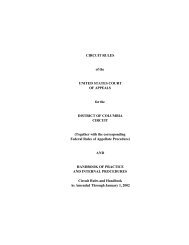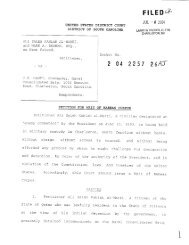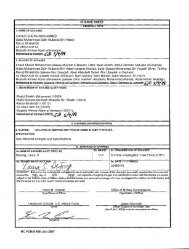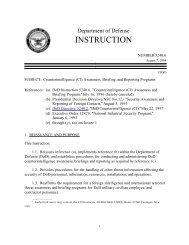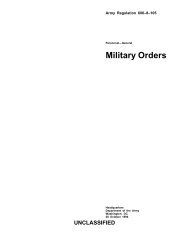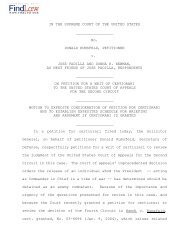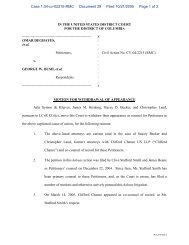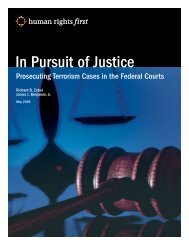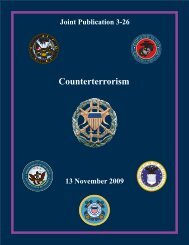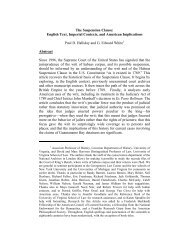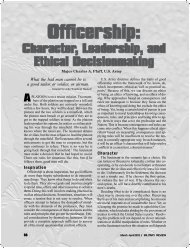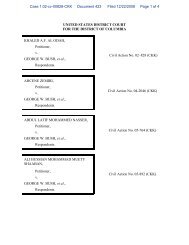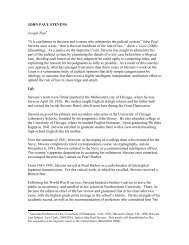Government Merits Brief - Hamdan v. Rumsfeld
Government Merits Brief - Hamdan v. Rumsfeld
Government Merits Brief - Hamdan v. Rumsfeld
You also want an ePaper? Increase the reach of your titles
YUMPU automatically turns print PDFs into web optimized ePapers that Google loves.
37<br />
court of appeals to have considered the question has rejected<br />
the argument that the habeas statute allows for enforcement<br />
of treaties that do not themselves create judicially enforceable<br />
rights. See Poindexter v. Nash, 333 F.3d 372 (2d Cir. 2003),<br />
cert. denied, 540 U.S. 1210 (2004); Wesson v. United States<br />
Penitentiary Beaumont, 305 F.3d 343 (5th Cir. 2002), cert.<br />
denied, 537 U.S. 1241 (2003); Hain v. Gibson, 287 F.3d 1224<br />
(10th Cir. 2002), cert. denied, 537 U.S. 1173 (2003); United<br />
States ex rel. Perez v. Warden, 286 F.3d 1059 (8th Cir.), cert.<br />
denied, 537 U.S. 869 (2002). Petitioner has provided no basis<br />
for this Court to depart from that settled understanding. 13<br />
b. Petitioner has no valid claim under the Convention<br />
in any event<br />
i. Even if the Geneva Convention were judicially enforceable,<br />
it is inapplicable to the ongoing conflict with al<br />
not purport to hold that treaty rights are privately enforceable in habeas, and<br />
Wildenhus’s Case sheds no light on the question whether the Geneva<br />
Convention, a treaty that implicates the President’s core Commander-in-Chief<br />
powers, may be privately enforced in habeas. The other cases on which<br />
petitioner relies are similarly unavailing. In Ogbudimkpa v. Ashcroft, 342 F.3d<br />
207 (2003), the Third Circuit expressly declined to consider an argument<br />
similar to that advanced by petitioner. See id. at 218 n.22. In Wang v.<br />
Ashcroft, 320 F.3d 130 (2003), the Second Circuit allowed a habeas petitioner<br />
to enforce rights created not by a treaty, but by statute. See id . at 140-141.<br />
13 Moreover, in enacting the DTA, Congress has removed any basis for<br />
arguing that the habeas statute provides a mechanism for enforcing the Geneva<br />
Convention. Congress has replaced habeas jurisdiction with an exclusive<br />
review mechanism that, in contrast to the habeas statute it displaced, omits<br />
treaty-based challenges. See DTA § 1005(e)(2)(C)(ii) and (3)(D)(ii), 119 Stat.<br />
2742, 2743. That action would preclude claims even under treaties that, unlike<br />
the Geneva Convention, give rise to judicially enforceable individual rights, and<br />
is clearly inconsistent with any notion that Congress acted to make the Geneva<br />
Convention applicable to al Qaeda, let alone in any judicially enforceable<br />
manner. Likewise, the system of judicial review that Congress established<br />
presupposes that CSRTs will obviate any treaty-based claim to an essentially<br />
duplicative Article 5 tribunal. See DTA § 1005(e)(2), 119 Stat. 2742.



